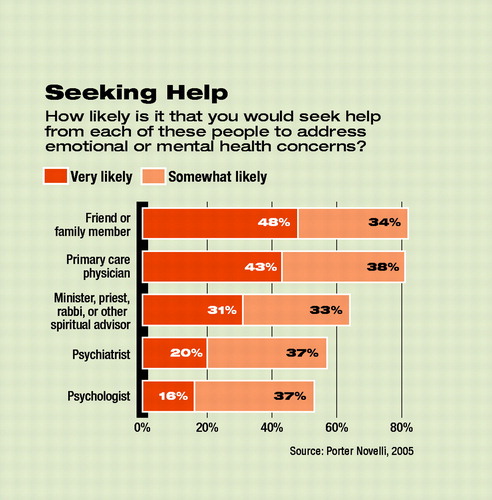Americans Speak Their Minds
To help frame the message in its new “Healthy Minds. Healthy Lives” public education campaign, APA commissioned a telephone survey of a random sample of adults aged 18 and older that explored their attitudes toward psychiatrists and mental health professionals and their views on mental illness and its treatment. A total of 1,020 respondents completed the survey, which was conducted from March 31 through April 3 by the American Staffing Association using a survey developed by Opinion Research Corporation.
The survey found that most of the respondents viewed psychiatry with a neutral to positive attitude—only 13 percent said they have a negative opinion of psychiatrists—and that years of efforts to reduce the stigma preventing people from seeking mental health care are paying off. The results also showed, however, how much work needs to be done to educate the public about the role of psychiatrists and the treatments they provide.
Here are some of the survey's findings:
33 percent of respondents characterized their view of psychiatrists as“ very” or “somewhat” positive, while 13 percent had negative views. The remaining 54 percent had a neutral view or said they“ weren't sure” or “weren't familiar” with psychiatry (see chart on Original article: page 1). For comparison, 79 percent said they had a positive view of primary care physicians. | |||||
Women had a slightly more positive view of psychiatrists, with 37 percent giving a positive response compared with 31 percent of men. | |||||
81 percent of younger (aged 35-45) respondents believe that treatments for mental health are effective, while 70 percent of those aged 65 and above hold such a belief. | |||||
More younger than older respondents (72 percent vs. 59 percent) agreed with the statement that seeing a psychiatrist is a sign of strength. | |||||
75 percent said that they knew that psychiatrists were medical doctors, though 38 percent also said that psychologists were medical doctors. | |||||
33 percent said they or a family member had seen a psychiatrist. About the same percentage said they had seen a psychologist. | |||||
18 percent said they would not see a psychiatrist under any circumstance, and 23 percent indicated the same for seeing a psychologist. | |||||
89 percent said they believe people with a mental illness can lead healthy lives. | |||||
75 percent agreed that mental illness can result from a chemical imbalance in the brain. | |||||
80 percent said they believe that treatment for mental illness works, but considerable skepticism remains, with 52 percent saying they“ somewhat” agreed with such a belief and 28 percent saying they“ strongly” agreed. | |||||
33 percent said they believe that medications prescribed for psychiatric illnesses do more harm than good. | |||||
22 percent said they believe that the only people who would benefit from a psychiatrist's care are those with serious mental illnesses. | |||||
43 percent of respondents who think they or a family member needs mental health care said they were “very” likely to seek it from a primary care physician, while just 20 percent said they were “very” likely to turn to a psychiatrist. | |||||




